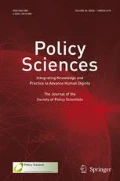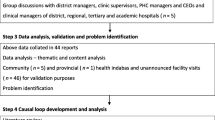Abstract
This paper responds to recent calls for more theoretically driven advancements of the Multiple Streams Approach (MSA). It does so by bringing networks theorizing into dialogue with the MSA; highlighting the inclusionary and exclusionary power of networks for determining problem frames and issue recognition. Subsequently, the paper argues that the addition of networks provides a clearer articulation of the role of institutions in steering problem stream processes, which have often been neglected within the MSA at the expense of a focus on agency. The paper puts forward two propositions. The first is that an issue is more likely to be recognised as a problem if it is considered compatible with the ‘appreciative system’ of the network's dominant coalition. The second proposition is that the more organisations a network consists of and the more varied these organisations are, the more likely it is that the dominant coalition alters a condition’s category if there are changes in the problem stream. These propositions are explored through a comparative analysis of recognition of quality of life as a problem in two local level transport sector networks in the UK. Support for these propositions in the findings suggest that the introduction of networks into the MSA can reduce ambiguity and therefore fortuity in relation to problem recognition; second, that the power of the policy entrepreneur can be facilitated or constrained by the institutional context; and third, that comparing multiple issues and their interactions is important for further advancement of the MSA.
Similar content being viewed by others
Notes
Interviews conducted between 2012 and 2014.
Local transport authorities have a duty under the Transport Act (2000) to create a Local Transport Plan that sets out the local authority’s strategic plan for transport in their area. At the time of research the Local Transport Plans needed to be renewed every 5 years, hence the third Local Transport Plan being due for publication in 2011.
The Cities and Local Government Act 2016 established a Combined Authority for the Sheffield City Region, replacing the existing Integrated Transport Authority and Passenger Transport Executive arrangement.
References
Ansell, C. (2008). Network institutionalism. In R. A. W. Rhodes, S. Binder, & B. A. Rockman (Eds.), The Oxford handbook of political institutions (Vol. 2, pp. 75–89). Oxford: Oxford University Press.
Bache, I. (2003). Governing through governance: Education policy control under new labour. Political Studies, 51(2), 300–314.
Bache, I., & Reardon, L. (2016). The politics and policy of wellbeing: Understanding the rise and significance of a new agenda. London: Edward Elgar.
Bache, I., Reardon, L., Bartle, I., Flinders, M., & Marsden, G. (2015). Symbolic meta-policy: (Not) tackling climate change in the transport sector. Political Studies, 63, 830–851.
Ball, S. (2008). New philanthropy, new networks and new governance in education. Political Studies, 56(4), 747–765.
Barzelay, M., & Gallego, R. (2006). From “new institutionalism” to “institutional processualism”: Advancing knowledge about public management policy change. Governance, 19(4), 531–557.
Biernacki, P., & Waldorf, D. (1981). Snowball sampling: Problems and techniques of chain referral sampling. Sociological Methods & Research, 10(2), 141–163.
Börzel, T. (1998). Networks: Reified metaphor or governance panacea? Public Administration, 89, 49–63.
Bosomworth, K. (2015). Climate change adaptation in public policy: Frames, fire management, and frame reflection. Environment and Planning C: Government and Policy, 33, 1450–1466.
Butcher, L. (2013). Local transport governance and finance in England, 2010-: Standard note N5735. London: House of Commons Library.
Cairney, P., & Jones, M. (2016). Kingdon’s Multiple Streams Approach: What is the empirical impact of this universal theory? The Policy Studies Journal, 44(1), 37–58.
City of York Council. (2001). Local transport plan. York: City of York Council.
City of York Council. (2006). Local transport plan 2006–2011. York: City of York Council.
City of York Council. (2010a). Traffic Congestion Ad Hoc Scrutiny Committee—final report. York: City of York Council.
City of York Council. (2010b). Towards a new local transport plan for York—LTP3: Issues and priorities—Draft report. York: City of York Council.
City of York Council. (2011a). Local transport plan 2011–2031. York: City of York Council.
City of York Council. (2011b). City of York local development framework. York: City of York Council.
Cohen, M. D., March, J. G., & Olsen, J. P. (1972). A garbage can model of organizational choice. Administrative Science Quarterly, 17(1), 1–25.
Compston, H. (2009). Networks, resources, political strategy and climate policy. Environmental Politics, 18(5), 727–746.
DfT. (2007). Towards a sustainable transport system. London: HMSO.
DfT. (2008). Delivering a sustainable transport system. London: HMSO.
Dudley, G. (2013). Why do ideas succeed and fail over time? The role of narratives in policy windows and the case of the London congestion charge. Journal of European Public Policy, 20(8), 1139–1156.
Exworthy, M., Berney, L., & Powell, M. (2002). “How great expectations in Westminster may be dashed locally”: The local implementation of national policy on health inequalities. Policy & Politics, 30(1), 79–96.
Fischer, T. B. (2004). Transport policy making and SEA in Liverpool, Amsterdam and Berlin—1997 and 2002. Environmental Impact Assessment Review, 24, 319–336.
Gent, C. E. (2000). Needle exchange policy adoption in American cities: Why not? Policy Sciences, 33, 125–153.
Greer, A. (2002). Policy networks and policy change in organic agriculture: A comparative analysis of the UK and Ireland. Public Administration, 80(3), 453–473.
Hall, P. A. (1986). Governing the economy: The politics of state intervention in Britain and France. Oxford: Oxford University Press.
Herweg, N., Zahariadis, N., & Zohlnhöfer, R. (2017). The multiple streams framework: Foundations, refinements and empirical applications. In C. M. Weible & P. A. Sabatier (Eds.), Theories of the policy process (4th ed., pp. 17–54). Boulder, CO: Westview.
Hindmoor, A. (2009). Explaining networks through mechanisms: Vaccination, priming and the 2001 foot and mouth disease crisis. Political Studies, 57(1), 75–94.
Hooghe, L., & Marks, G. (2003). Unraveling the Central State, but how? Types of multi-level governance. American Political Science Review, 97(2), 233–243.
Huitema, D., Lebel, L., & Meijerink, S. (2011). The strategies of policy entrepreneurs in water transitions around the world. Water Policy, 13(5), 717–733.
Jones, M., Peterson, H., Pierce, J., Herweg, N., Bernal, A., Lamberta Raney, H., et al. (2016). A river runs through it: A multiple streams meta-review. The Policy Studies Journal, 44(1), 13–36.
Kingdon, John. (1995). Agendas, alternatives, and public policies (4th ed.). London: Harper Collins College Publishers.
Knaggård, Ǻ. (2015). The multiple streams framework and the problem broker. European Journal of Political Research, 54, 450–465.
March, J. G., & Olsen, J. P. (1979). Ambiguity and choice in organizations. Bergen: Universitetsforlaget.
Marinetto, M. (2003). Governing beyond the centre: A critique of the Anglo-governance school. Political Studies, 51, 592–608.
Marsh, D., & Rhodes, R. (eds.) (1992). Policy networks in British government. Oxford: Clarendon Press.
Mucciaroni, G. (1992). The garbage can model the study of policy making: A critique. Polity, 24(3), 459–482.
Rhodes, R. (1999). Control and power in central-local government relations (2nd ed.). Aldershot: Ashgate.
Rhodes, R. (2007). Understanding governance: Ten years on. Organization Studies, 28(8), 1243–1264.
Rochefort, D. A., & Cobb, R. W. (Eds.) (1994). Problem definition: An emerging perspective. In The politics of problem definition: Shaping the policy agenda (pp. 1–31). Kansas: University Press of Kansas.
Schmidt, V. (2008). Discursive institutionalism: The explanatory power of ideas and discourse. Annual Review of Political Science, 11, 303–326.
Schmidt, V. (2012). Discursive institutionalism: Scope, dynamics, and philosophical underpinnings. In F. Fischer & H. Gottweis (Eds.), The argumentative turn revisited: Public policy as communicative practice (pp. 85–113). Durham: Duke University Press.
Scholten, P. W. A. (2013). Agenda dynamics and the multi-level governance of intractable policy controversies: The case of migrant integration policies in the Netherlands. Policy Science, 46(3), 217–236.
Schön, D. A., & Rein, M. (1994). Frame reflection: Toward the resolution of intractable policy controversies. New York: Basic Books.
Smith, A. (2000). Policy networks and advocacy coalitions: Explaining policy change and stability in UK industrial pollution policy? Environment and Planning C: Government and Policy, 18, 95–114.
Somerville, W., & Wallace Goodman, S. (2010). The role of networks in the development of UK migration policy. Political Studies, 58(5), 951–970.
Stoker, G. (1998). Governance as theory: Five propositions. International Social Science Journal, 50(55), 17–28.
Winkel, G., & Leipold, S. (2016). Demolishing dikes: Multiple streams and policy discourse analysis. The Policy Studies Journal, 44(1), 108–129.
Yin, R. (2003). Case study research: Design and methods, 3rd edn. London: Sage.
Zahariadis, N. (2008). Ambiguity and choice in European public policy. Journal of European Public Policy, 15(4), 514–530.
Zahariadis, N. (2014). Ambiguity and multiple streams. In P. A. Sabatier & C. Weible (Eds.), Theories of the policy process (3rd ed., pp. 25–58). Westfield: Westfield Press.
Zahariadis, N., & Allen, C. (1995). Ideas, networks, and policy streams: Privatization in Britain and Germany. Review of Policy Research, 14(1–2), 71–98.
Zohlnhöfer, R., Herweg, N., & Rüb, F. (2015). Theoretically refining the multiple streams framework: An introduction. European Journal of Political Research, 54(3), 412–418.
Acknowledgements
Many thanks go to Professor Ian Bache, Professor Greg Marsden and Professor Nikolaos Zahariadis for their very helpful feedback on earlier drafts of this paper. I am also endebted to the two anonymous Policy Sciences reviewers for their very constructive comments. The research underpinning this paper was funded by an Economic and Social Research Council (ESRC) Ph.D. Scholarship (Grant Reference ES/I023615/1), for which I am very grateful.
Author information
Authors and Affiliations
Corresponding author
Rights and permissions
About this article
Cite this article
Reardon, L. Networks and problem recognition: advancing the Multiple Streams Approach. Policy Sci 51, 457–476 (2018). https://doi.org/10.1007/s11077-018-9330-8
Published:
Issue Date:
DOI: https://doi.org/10.1007/s11077-018-9330-8



